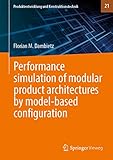Performance Simulation of Modular Product Architectures by Model-Based Configuration / Florian Dambietz.
Material type: TextSeries: Produktentwicklung und Konstruktionstechnik 21Publication details: Berlin, Germany: Springer, 2022.Description: 178 Pages; 25 cmISBN:
TextSeries: Produktentwicklung und Konstruktionstechnik 21Publication details: Berlin, Germany: Springer, 2022.Description: 178 Pages; 25 cmISBN: - 9783662642320
- TA168 .D156 2022
| Item type | Current library | Collection | Call number | Copy number | Status | Notes | Barcode | |
|---|---|---|---|---|---|---|---|---|
 Books
Books
|
Rabdan Academy General Stacks | General Collection | TA168 .D156 2022 (Browse shelf(Opens below)) | C. 1 | Available | AED 321.00 | 23307 |
Browsing Rabdan Academy shelves,Shelving location: General Stacks,Collection: General Collection Close shelf browser (Hides shelf browser)

|

|

|

|

|

|

|
||
| TA168 .C495 2010 Modeling and Simulation of Systems Using MATLAB and Simulink / | TA168 .C518 2011 Stochastic Simulation Optimization : an optimal computing budget allocation / | TA168 .C532 2022 An Introduction To System Modeling and Control / | TA168 .D156 2022 Performance Simulation of Modular Product Architectures by Model-Based Configuration / | TA168 .D294 2023 Decision Making in Systems Engineering and Management / | TA168 .D294 2023 Decision Making in Systems Engineering and Management / | TA168 .D294 2023 Decision Making in Systems Engineering and Management / |
The use of modular product architectures can significantly increase the efficiency in manufacturing companies. Various modularization methods are used in the development of these architectures, but they always result in different architecture alternatives. This thesis describes the development of a model-based simulation for multi-dimensional performance assessment of these architecture alternatives with their corresponding modular kits. The central element of this simulation is formed by a model-based configuration system, identifying individually valid product variants using concepts and tools of Model-based-systems-engineering (MBSE). Based on the developed Hyperspace algorithm, a geometric-mathematical solution approach, these variants are then evaluated considering multiple parameters. By recursively configuring multiple customer requests using alternative modular kits, an individual performance criterion of these alternatives can be generated, including customer-, market- and company parameters. This thesis describes the development of the performance simulation on the basis of a simplified explanation example. A validation based on customer-specific laser welding systems is also shown.
There are no comments on this title.
